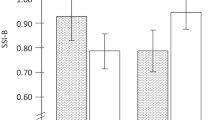Abstract
Background
Metabolic syndrome (MetS) is a group of cardiovascular risk factors including elevated blood pressure, elevated triglycerides, decreased high-density lipoprotein cholesterol, impaired fasting glucose, and abdominal obesity, which disproportionately affects Hispanics/Latinos. The present study examined associations between perceived discrimination and MetS in Hispanic/Latino adults from various background groups (i.e., Dominican, Central American, Cuban, Mexican, Puerto Rican, South American).
Methods
Data were obtained from 5174 Hispanics/Latinos who participated in the Hispanic Community Health Study/Study of Latinos (HCHS/SOL) Sociocultural Ancillary Study. MetS components and covariates were measured at a baseline examination, and perceived discrimination was assessed within 9 months of baseline. Path analysis modeled associations of perceived discrimination with MetS prevalence and each of the six components of MetS, controlling for age, sex, income, acculturation, physical activity, diet, smoking, and alcohol use.
Results
Among the full cohort, perceived discrimination was not associated with MetS prevalence in any of the models evaluated. Higher perceived discrimination at work/school was associated with larger waist circumference. When examining background groups separately, higher perceived ethnicity-associated threat was related to increased MetS prevalence only among individuals of Central American background. Differential patterns of association between perceived discrimination and MetS components were found for different background groups.
Conclusions
Overall results suggested that perceived discrimination was not strongly or consistently associated with MetS among Hispanics/Latinos.

Similar content being viewed by others
References
Alberti KG, Eckel RH, Grundy SM, Zimmet PZ, Cleeman JI, Donato KA, et al. Harmonizing the metabolic syndrome: a joint interim statement of the International Diabetes Federation Task Force on Epidemiology and Prevention; National Heart, Lung, and Blood Institute; American Heart Association; World Heart Federation; International Atherosclerosis Society; and International Association for the Study of Obesity. Circulation. 2009;120:1640–5.
Aguilar M, Bhuket T, Torres S, Liu B, Wong RJ. Prevalence of the metabolic syndrome in the United States, 2003-2012. JAMA. 2015;313:1973–4.
Heiss G, Snyder ML, Teng Y, Schneiderman N, Llabre MM, Cowie C, et al. Prevalence of metabolic syndrome among Hispanics/Latinos of diverse background: the Hispanic Community Health Study/Study of Latinos. Diabetes Care. 2014;37:2391–12999.
Frank AT, Zhao B, Jose PO, Azar KM, Fortmann SP, Palaniappan LP. Racial/ethnic differences in dyslipidemia patterns. Circulation. 2014;129:570–9.
Colby SL, Otman JM. Projections of the size and composition of the U.S. population: 2014 to 2060, current population reports, P25–1143. Washington, DC: 2014.
Goldbacher EM, Matthews KA. Are psychological characteristics related to risk of the metabolic syndrome? A review of the literature. Ann Behav Med. 2007;34:240–52.
Pascoe EA, Richman LS. Perceived discrimination and health: a meta-analytic review. Psychol Bull. 2009;135:531–54.
Gallo LC, Matthews KA. Understanding the association between socioeconomic status and physical health: do negative emotions play a role? Psychol Bull. 2003;129:10–51.
Gallo LC, de los Monteros KE, Ferent V, Urbina J, Talavera G. Education, psychosocial resources, and metabolic syndrome variables in Latinas. Ann Behav Med. 2007;34:14–25.
McCurley JL, Penedo F, Roesch SC, et al. Psychosocial factors in the relationship between socioeconomic status and cardiometabolic risk: the HCHS/SOL Sociocultural Ancillary Study. Ann Behav Med. 2017;51:477–88.
Wagner JA, Tennen H, Feinn R, Osborn CY. Self-reported discrimination, diabetes distress, and continuous blood glucose in women with type 2 diabetes. J Immigr Minor Health. 2015;17:566–73.
Dolezsar CM, McGrath JJ, Herzig AJ, Miller SB. Perceived racial discrimination and hypertension: a comprehensive systematic review. Health Psychol. 2014;33:20–34.
Ryan AM, Gee GC, Laflamme DF. The association between self-reported discrimination, physical health and blood pressure: findings from African Americans, black immigrants, and Latino immigrants in New Hampshire. J Health Care Poor Underserved. 2006;17:116–32.
Everson-Rose SA, Lutsey PL, Roetker NS, Lewis TT, Kershaw KN, Alonso A, et al. Perceived discrimination and incident cardiovascular events: the multi-ethnic study of atherosclerosis. Am J Epidemiol. 2015;182:225–34.
Daviglus ML, Talavera GA, Aviles-Santa ML, et al. Prevalence of major cardiovascular risk factors and cardiovascular diseases among Hispanic/Latino individuals of diverse backgrounds in the United States. JAMA. 2012;308:1775–84.
Escobedo J, Schargrodsky H, Champagne B, Silva H, Boissonnet CP, Vinueza R, et al. Prevalence of the metabolic syndrome in Latin America and its association with sub-clinical carotid atherosclerosis: the CARMELA cross sectional study. Cardiovasc Diabetol. 2009;8:52.
Wong-McClure RA, Gregg EW, Barcelo A, et al. Prevalence of metabolic syndrome in Central America: a cross-sectional population-based study. Rev Panam Salud Publica. 2015;38:202–8.
Ai AL, Appel HB, Huang B, Lee K. Overall health and healthcare utilization among Latino American women in the United States. J Women's Health. 2012;21:878–85.
Ai AL, Noël LT, Appel HB, Huang B, Hefley WE. Overall health and health care utilization among Latino American men in the United States. Am J Mens Health. 2012;7:6–17.
Neighbors CJ, Marquez DX, Marcus BH. Leisure-time physical activity disparities among Hispanic subgroups in the United States. Am J Public Health. 2008;98:1460–4.
Siega-Riz AM, Sotres-Alvarez D, Ayala GX, Ginsberg M, Himes JH, Liu K, et al. Food-group and nutrient-density intakes by Hispanic and Latino backgrounds in the Hispanic Community Health Study/Study of Latinos. Am J Clin Nutr. 2014;99:1487–98.
Kaplan RC, Bangdiwala SI, Barnhart JM, Castañeda SF, Gellman MD, Lee DJ, et al. Smoking among U.S. Hispanic/Latino adults The Hispanic Community Health Study/Study of Latinos. Am J Prev Med. 2014;46:496–506.
Blendon RJ, Benson JM, Gorski MT, Weldon KJ, Pérez DJ, Mann F, et al. The perspectives of six Latino heritage groups about their health care. J Immigr Minor Health. 2015;17:1347–54.
Arellano-Morales L, Roesch SC, Gallo LC, Emory KT, Molina KM, Gonzalez P, et al. Prevalence and correlates of perceived ethnic discrimination in the Hispanic Community Health Study/Study of Latinos Sociocultural Ancillary Study. J Lat Psychol. 2015;3:160–76.
Caetano R, Ramisetty-Mikler S, Rodriguez LA. The Hispanic Americans Baseline Alcohol Survey (HABLAS): the association between birthplace, acculturation and alcohol abuse and dependence across Hispanic national groups. Drug Alcohol Depend. 2009;99:215–21.
Vaeth PA, Caetano R, Rodriguez LA. The Hispanic Americans Baseline Alcohol Survey (HABLAS): the association between acculturation, birthplace and alcohol consumption across Hispanic national groups. Addict Behav. 2012;37:1029–37.
Sorlie PD, Avilés-Santa LM, Wassertheil-Smoller S, Kaplan RC, Daviglus ML, Giachello AL, et al. Design and implementation of the Hispanic Community Health Study/Study of Latinos. Ann Epidemiol. 2010;20:629–41.
Gallo LC, Penedo FJ, Carnethon M, Isasi CR, Sotres-Alvarez D, Malcarne VL, et al. The Hispanic Community Health Study/Study of Latinos Sociocultural Ancillary Study: sample, design, and procedures. Ethn Dis. 2014;24:77–83.
LaVange LM, Kalsbeek WD, Sorlie PD, et al. Sample design and cohort selection in the Hispanic Community Health Study/Study of Latinos. Ann Epidemiol. 2010;20:642–9.
Grundy SM, Brewer HB Jr, Cleeman JI, Smith SC Jr, Lenfant C. Definition of metabolic syndrome: report of the National Heart, Lung, and Blood Institute/American Heart Association conference on scientific issues related to definition. Circulation. 2004;109:433–8.
Brondolo E, Kelly KP, Coakley V, Gordon T, Thompson S, Levy E, et al. The perceived ethnic discrimination questionnaire: development and preliminary validation of a community version. J Appl Soc Psychol. 2005;35:335–65.
Atkins R. Instruments measuring perceived racism/racial discrimination: review and critique of factor analytic techniques. Int J Health Serv. 2014;44:711–34.
Marin G, Sabogal F, Marin BV, Otero-Sabogal R, Perez-Stable EJ. Development of a short acculturation scale for Hispanics. Hisp J Behav Sci. 1987;9:183–205.
Armstrong T, Bull F. Development of the World Health Organization Global Physical Activity Questionnaire (GPAQ). J Public Health. 2006;14:66–70.
Chiuve SE, Fung TT, Rimm EB, Hu FB, McCullough ML, Wang M, et al. Alternative dietary indices both strongly predict risk of chronic disease. J Nutr. 2012;142:1009–18.
US Department of Health and Human Services. National Institute on Alcohol Abuse and Alcoholism: helping patients who drink too much: a Clinician’s guide. 2005 edition. 2007.
Klem LG, Grimm G, Yarnould PR. Path analysis: reading and understanding multivariate statistics. Washington: American Psychological Association; 1995.
R Core Team. R: a language and environment for statistical computing. Vienna: R Foundation for Statistical Computing; 2015. Available from: http://www.R-project.org/.
Muthén LK, Muthén BO. Mplus user's guide. 6th ed. Los Angeles, CA: Muthén & Muthén; 1998-2011.
Hallquist MN, Wiley JF. MplusAutomation: an R package for facilitating large-scale latent variable analyses in Mplus. Struct Equ Model. 2018;25:621–38.
Asparouhov T. Sampling weights in latent variable modeling. Struct Equ Model. 2005;12:411–34.
Enders CK. Applied missing data analysis. New York: Guilford Press; 2010.
Lewis TT, Barnes LL, Bienias JL, Lackland DT, Evans DA, Mendes de Leon CF. Perceived discrimination and blood pressure in older African American and white adults. J Gerontol A Biol Sci Med Sci. 2009;64:1002–8.
Thomas KS, Nelesen RA, Malcarne VL, Ziegler MG, Dimsdale JE. Ethnicity, perceived discrimination, and vascular reactivity to phenylephrine. Psychosom Med. 2006;68:692–7.
Pérez DJ, Fortuna L, Alegria M. Prevalence and correlates of everyday discrimination among US Latinos. J Commun Psychol. 2008;36:421–33.
Lee DL, Ahn S. Discrimination against Latina/os: a meta-analysis of individual-level resources and outcomes. Couns Psychol. 2012;40:28–65.
Castañeda SF, Buelna C, Giacinto RE, Gallo LC, Sotres-Alvarez D, Gonzalez P, et al. Cardiovascular disease risk factors and psychological distress among Hispanics/Latinos: the Hispanic Community Health Study/Study of Latinos (HCHS/SOL). Prev Med. 2016;87:144–50.
Lewis TT, Williams DR, Tamene M, Clark CR. Self-reported experiences of discrimination and cardiovascular disease. Curr Cardiovasc Risk Rep. 2014;8:365.
Pew Research Center. Mexican lawful immigrants among the least likely to become U.S. citizens; 2017. Available from: http://www.pewhispanic.org/2017/06/29/mexican-lawful-immigrants-among-least-likely-to-become-u-s-citizens/. Accessed January 2019
Acknowledgments
The authors would like to thank Katy Wortman for her assistance with data management and analysis. The authors thank the staff and participants of the HCHS/SOL and the HCHS/SOL Sociocultural Ancillary Study for their important contributions.
Funding
The Hispanic Community Health Study/Study of Latinos is a collaborative study supported by contracts from the National Heart, Lung, and Blood Institute (NHLBI) to the University of North Carolina (N01-HC65233), University of Miami (N01-HC65234), Albert Einstein College of Medicine (N01-HC65235), N01-HC-65236 Northwestern University (N01-HC65236), and San Diego State University (N01-HC65237). The following institutes/centers/offices contribute to the HCHS/SOL through a transfer of funds to the NHLBI: National Institute on Minority Health and Health Disparities, National Institute on Deafness and Other Communication Disorders, National Institute of Dental and Craniofacial Research, National Institute of Diabetes and Digestive and Kidney Diseases, National Institute of Neurological Disorders and Stroke, and NIH Institution-Office of Dietary Supplements. The HCHS/SOL Sociocultural Ancillary Study was supported by grant 1 RC2 HL101649 from the NHLBI/NIH. Rina S. Fox was supported through a National Cancer Institute Training Grant (5T32CA193193).
Author information
Authors and Affiliations
Corresponding author
Ethics declarations
Ethical Approval
All procedures performed in studies involving human participants were in accordance with the ethical standards of the institutional and/or national research committee and with the 1964 Helsinki declaration and its later amendments or comparable ethical standards.
Conflict of Interest
The authors declare that they have no conflict of interest.
Additional information
Publisher’s Note
Springer Nature remains neutral with regard to jurisdictional claims in published maps and institutional affiliations.
Rights and permissions
About this article
Cite this article
Fox, R.S., Carnethon, M.R., Gallo, L.C. et al. Perceived Discrimination and Cardiometabolic Risk Among US Hispanics/Latinos in the HCHS/SOL Sociocultural Ancillary Study. Int.J. Behav. Med. 26, 331–342 (2019). https://doi.org/10.1007/s12529-019-09782-7
Published:
Issue Date:
DOI: https://doi.org/10.1007/s12529-019-09782-7




